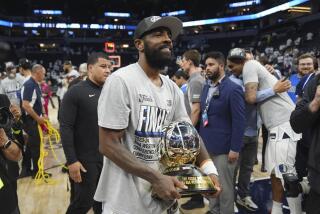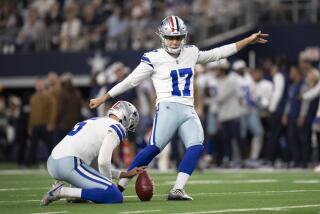On the Outside, Still Looking In : After Excelling at Indoor Game, Ervine Is Readjusting His Soccer Skills
The topic that every professional athlete must eventually confront was mentioned. Dale Ervine didn’t want to talk about it.
What will you do when you can’t make a living playing soccer any longer?
The backup midfielder for the L.A. Salsa, perhaps at a turning point in his career, rolled his greenish-blue eyes and pushed back in a chair.
“I don’t know,” he said. “Soccer has given me and my family everything I own.”
Low scoring. Dull. Misunderstood. Nevertheless, soccer in the United States has been good to Ervine, a two-time All-American at UCLA and former North Torrance High player who isn’t used to sitting on the bench.
Ervine let out a sigh.
“It’s amazing, considering how unstable soccer has been in this country, that I have been paid to play it here for eight years,” he said.
Ervine, 29, earned $60,000 a season for almost seven winters with the Wichita Wings of the defunct Major Soccer League. He had a comfortable life, bought a house in Kansas and started a family.
He would escape the sultry Midwestern summers, returning to the South Bay year after year to add to his earnings by playing outdoors for the L.A. Heat of the American Professional Soccer League.
In any other country a player of Ervine’s caliber would have it made for life. But soccer
has had a difficult time gaining a foothold in the United States and full-time professional players are few and far between.
The Heat folded after the 1990 season. The entire MSL folded last fall. Ervine was forced to look beyond the arena doors seriously for the first time.
The Salsa was forming in Montebello. Brazilian-born Rildo Menezes, who coached the defunct California Emperors in the APSL in 1990, remembered Ervine from the Heat and wanted him.
“He’s a team leader and organizer who can make the team score,” Menezes said of Ervine. “He has very good skills and great touch on the ball.”
In late April, a week before the league season began, Ervine signed a two-year contract for an undisclosed amount with the Salsa, joining four other former Heat players on the team. He started 10 of the club’s first 11 matches.
Lately, however, Menezes has tried new lineups, suggesting that Ervine’s playing time might be limited, at least for a while, until he settles on the outdoor game.
“Dale has all the tools and ability to be a very, very solid player for us,” Salsa General Manager Rick Davis said. “He needs to get acclimated back to the outdoor game. I figured when we signed him that it would be a six-month transition period.”
The indoor game requires quick reactions in tight spaces, short passes and playing the ball off the glass or boards, much like hockey players do with a puck. The playing fields are the size of an ice rink and the net is about twice as small as the 8-feet-high, 18-feet-wide outdoor goal mouths. Indoor soccer is played in four, 15-minute periods with ample timeouts. The outdoor game consists of two, 45-minute periods. Time is stopped only at the referee’s discretion for serious injuries.
“There’s no comparison between the two games,” Ervine said. “The fitness level is different. The mental approach to the game is different. Indoors is much more one-on-one all over the field.”
Soccer has always been the driving force in Ervine’s life. Born in Ireland and raised in the South Bay, he grew up when the area was a hotbed of youth soccer.
“In the South Bay, soccer was serious back then,” he said. “I remember seeing license plate covers at the fields that said it was ‘Soccer City USA.’ There was so much soccer talent in the South Bay, it was exciting to play. In grade school we played it during recess.”
Ervine was the captain of UCLA’s 1985 national championship team and a two-time All-American. He was drafted in the first round by Wichita of the then Major Indoor Soccer League in 1986. He was runner-up in balloting for rookie of the year and in 1989-90 scored 62 goals, the most in a season by an American.
Salsa management is betting that Ervine, once he adjusts to the outdoor game, will have similar success.
“For seven years I tried to do what I could to improve each season, to be the best I could be indoors,” Ervine said. “I worked hard at it. Now I need to adjust to more open spaces.”
Davis and Menezes appear willing to wait.
“I think the most important thing right now for Dale Ervine--and this will make a big difference in his game--is for him to gain his confidence back,” Davis said. “It takes time to adjust. Once he feels good about the way he’s playing, he’ll be fine.”
Menezes faults himself for putting Ervine in a difficult situation.
“He was indoors so long, then he came here,” he said. “I put him in the field too fast. He must go back to the confidence in himself he had before and show more soccer for the people.”
Ervine sees his soccer career lasting five or six more years, and he plans on getting his starting job back soon.
“He’s doing better in practice every day, and by the end of the season he will be ready to pull this team into the championship,” Menezes said.
What Ervine does after that is a mystery, especially to a man who has allowed sport to dominate his life.






